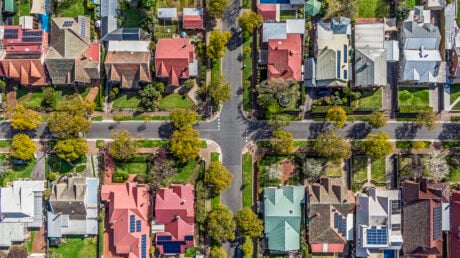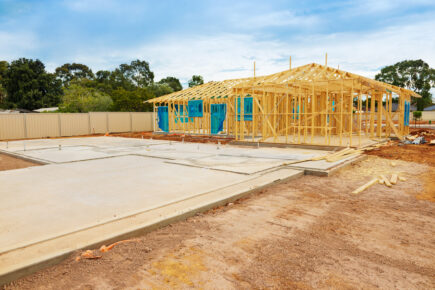Regardless of whether it’s your first investment property or not, as a general rule you will need a deposit to secure an investment loan.
In Australia, you will usually require a 20% deposit to avoid paying Lenders Mortgage Insurance. It is possible to secure an investor loan with a smaller deposit but this could mean paying LMI as well as a higher interest rate due to a higher perceived risk in the eyes of the lender.
What’s the minimum deposit required for an investment property?
Lenders use a measurement called loan-to-value ratio when assessing investor loans. LVR represents the loan size compared to a property’s value.
An LVR of over 80% will mean you are likely going to pay LMI and run into stricter lending criteria as the lender is taking on considerable risk.
The minimum deposit for an investor loan with the Big Four:
- Commbank: 5%
- ANZ: 10%
- NAB: 5%
- Westpac: 5%
🤓 Nerdy Tip: It’s important to speak with a lender or mortgage broker directly, as most banks and lender will have additional credit criteria that you may need to meet to be eligible for a 95% LVR investor loan.
Ways to get your deposit together
Saving up the cash
Property investors, just like owner-occupiers, can secure a loan by saving up a cash deposit (usually representing 20% of the total value).
For example, if your ideal investment property is $500,000, you would need $100,000 in savings.
Leveraging equity
Many investors use equity in an existing property to help buy their next property. Equity is the portion of the property you own outright. You can calculate your equity by subtracting the remaining loan amount from the property’s value.
For example, if your property is valued at $500,000 and you have $200,000 remaining on your home loan, you have $300,000 in equity.
Lenders will usually allow you to access 80% of the property’s current market value minus what is owed on the mortgage – this is called usable equity.
Calculate your usable equity with this formula:
Property value x 80% – what you owe = your usable equity.
Using a deposit bond
A deposit bond is a type of insurance that guarantees the deposit to a lender. It is sometimes used at auctions as a proof that you have the funds available, and in this case, you would pay back the insurer for the deposit bond.
Large vs. small deposit
Typical deposit size for investors
Property in Australia has seen steady growth in value over a long period of time. In 2010, the median house price in Sydney was $643,073, compared to $1,595,310 in December 2023.
This historical success has prompted many Australians to invest in property, with hopes of reaping similar capital gains. One strategy is to apply for investor loans with a small deposit, to secure the asset (property) sooner and see it increase in value while paying more upfront costs such as LMI.
Hypothetically, a 20% deposit for a median house in Sydney would be $319,062. Therefore, an investor may choose to aim for a 10% deposit, ($159, 531), pay LMI and hope the property continues to rise in value and generate rental income as they pay off the loan. However, this would also mean paying an estimated $70,000 in LMI upfront. Whilst this strategy may be available, it does come with risk. Property prices are not always guaranteed to increase and will fluctuate over time depending on market conditions and other economic factors.
Considerations for a large deposit
Benefits
- Paying less interest over the term of the loan
- A stronger LVR
- A better interest rate
Risks
- It may take longer to save up and you miss out on rental income and capital gain in the meantime.
- The property market could experience rapid growth while you are saving up your deposit, outpacing your ability to save.
Considerations for a small deposit
Benefits
- You can get into the property market sooner and build wealth through capital gains.
- You can start getting passive rental income sooner.
- You could put money into renovations rather than the deposit which may help to increase the property’s market value.
Risks
- You may have to pay LMI, which will be an extra cost on top of your repayments
- You could pay a higher interest rate
- The property’s value could decrease.
How much deposit makes sense for you?
Your decision will be based on your own market research, financial position and investment goals, however some factors to consider include:
Can you afford to pay LMI?
If you are eager to break into the property market with a small deposit, you need to consider the cost of LMI. Lenders such as Westpac offer online tools to help you estimate how much LMI you may have to pay based on your deposit size, property type and location.
Gearing strategy
One of your financial decisions will be whether you aim to positively or negatively gear your property. Positive gearing is when your investment property generates profit through rental income. Negative gearing is when your property expenses (including deductible interest) outweigh your rental income, which may allow you to take advantage of tax concessions.
A financial advisor or tax specialist should be consulted to see whether you are able to obtain the tax concessions associated with negative gearing and how best to structure your lending before you take out an investment loan.
Loan type
Another important consideration is whether you will take on a principal and interest or interest only investor loan.
DIVE EVEN DEEPER

Can Foreigners Buy Property In Australia?
Foreigners — essentially, non-residents — can buy property in Australia, but must apply for approval to ensure overseas investments favour national interest.

How Much can I Afford to Borrow for an Investment Property?
The deposit, repayments and ongoing costs are among the things to consider when figuring out how much you can borrow for an investment property.

First Home Buyer Investment Property: Is It Possible?
Your first property doesn’t have to be a home where you live. Buying investment property as a first home buyer is often referred to as ‘rentvesting.’


